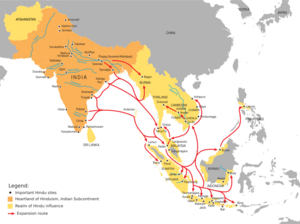Philosophy:Indian honorifics
Indian honorifics are honorific titles or appendices to names used in India , covering formal and informal social, commercial, and religious relationships. These may take the form of prefixes, suffixes or replacements.
Native honorifics
Honorifics with native/indigenous Hindu-Buddhist origin.
Hindu-Buddhist honorifics
List of titles
- Abhyasi
- Acharya
- Aasaan
- Ayya
- Baba
- Babu
- Bhagavan
- Bhagat
- Bhai
- Chhatrapati
- Chakravarti (Sanskrit term), Chakraborty
- Chettiar (suffix denoting a man's wealth)
- Chowdhury
- Deshmukh
- Dvija
- Gain / Gayen
- Gossain
- Guru
- Jagadguru
- Jagirdar
- Kothari (temple)
- Kumari
- Kumar (title), Kunwar (title)
- Mahamandaleshwar
- Mahant
- Maharaj, Maharaja, Maharajadhiraj
- Mahātmā
- Maharani
- Maharishi, Maharshi
- Mahayogi, Mahayogini
- Mankari[1]
- Mantrik
- Melshanthi
- Muni (Saint)
- patel
- Patil
- Pandit
- Paramahamsa
- Paramguru
- Pujari
- Raj
- Raja, Rai (title), Rana (title), Rao (title), Rawal, Rawat (title)
- Rajarshi
- Rajguru
- Rajkumar, Maharajkumar
- Rajkumari, Maharajkumari
- Rani
- Rishi
- Rishi Mudgal
- Sādhaka
- Sadhu
- Samanta (vassal)
- Samrat (emperor)
- Sannyasin
- Sardar
- Satguru, Sadguru
- Sawai (title)
- Sethi, Sheth (suffix denoting a man's wealth)
- Shankaracharya
- Shaunaka
- Shishya
- Sri (also Shri, Shree)
- Shrimati
- Swami
- Thakur
- Thiru or Thirumathi
- Yogi, Yogini
- Yuvraj
Community-specific honorifics
- Maratha titles
Secular profession-specific honorifics
- Lambardar
- Patwari
- Pandit
- Zamindar
- Ghatwal
- Mulraiyat
- Pradhan
- Jagirdar
- Mustajir
- Zaildar
- Talukdar
Influence on other cultures
With the expansion of Indosphere cultural influence of Greater India,[2] through transmission of Hinduism in Southeast Asia[3][4][5] and the Silk Road transmission of Buddhism[6][7] leading to Indianization of Southeast Asia with non-Indian southeast Asian native Indianized kingdoms[8] adopting Sanskritization[9] of their languages and titles as well as ongoing historic expansion of Indian diaspora has resulted in many overseas places having Indianised names (e.g. Sanskritised naming of people, Sanskritised naming of places, Sankritised institutional mottos, Sanskritised educational institute names), architecture, martial arts, music and dance, clothing, and cuisine.[10]
Please help expand the following partial list of Indian influenced honorifics:
- Burmese honorifics and Burmese Buddhist titles
- Cambodia honorifics
- Cham honorifics
- Filipino styles and honorifics
- Indonesian honorifics
- Khmer honorifics
- Lao honorifics
- Malay styles and titles
- Sinhala honorifics
- Thai royal and noble titles
Sikh honorifics
Muslim or foreign origin honorifics
- Bahadur
- Begum
- Darogha
- Dastur / Dastoor
- Hazrat
- Khan or Khatoon for females
- Mahaldar
- Mansabdar
- Mir
- Mirza
- Sahib
- Syed
- Taluqdar
- Ustad
References
See also
- Currently official honors
- Indian honours system
- Awards and decorations of the Indian Armed Forces
- Battle and theatre honours of the Indian Army
- India Style (manner of address)
- Past or unofficial honors
- English honorifics
- Order of British India
Citations
- ↑ T.N. Madan (1982). Way of Life: King, Householder, Renouncer : Essays in Honour of Louis Dumont (1st ed.). Institute of Economic Growth. p. 129. ISBN 81-208-0527-5. https://books.google.com/books?id=1_qMH9PY9fQC&pg=PA129.
- ↑ Kenneth R. Hal (1985). Maritime Trade and State Development in Early Southeast Asia. University of Hawaii Press. p. 63. ISBN 978-0-8248-0843-3. https://books.google.com/?id=ncqGAAAAIAAJ&q=funan+mountain+kings&dq=funan+mountain+kings.
- ↑ Guy, John (2014). Lost Kingdoms: Hindu-Buddhist Sculpture of Early Southeast Asia, Metropolitan museum, New York: exhibition catalogues. Metropolitan Museum of Art. ISBN 9781588395245. https://books.google.com/books?id=vO_-AgAAQBAJ&pg=PA11.
- ↑ "The spread of Hinduism in Southeast Asia and the Pacific". https://www.britannica.com/topic/Hinduism/The-spread-of-Hinduism-in-Southeast-Asia-and-the-Pacific.
- ↑ History of Ancient India Kapur, Kamlesh
- ↑ Fussman, Gérard (2008–2009). "History of India and Greater India". La Lettre du Collège de France (4): 24–25. doi:10.4000/lettre-cdf.756. https://lettre-cdf.revues.org/756. Retrieved 20 December 2016.
- ↑ Coedès, George (1968). Walter F. Vella. ed. The Indianized States of Southeast Asia. trans.Susan Brown Cowing. University of Hawaii Press. ISBN 978-0-8248-0368-1.
- ↑ Manguin, Pierre-Yves (2002), "From Funan to Sriwijaya: Cultural continuities and discontinuities in the Early Historical maritime states of Southeast Asia", 25 tahun kerjasama Pusat Penelitian Arkeologi dan Ecole française d'Extrême-Orient, Jakarta: Pusat Penelitian Arkeologi / EFEO, https://books.google.co.uk/books?id=NJBwAAAAMAAJ
- ↑ Lavy, Paul (2003), "As in Heaven, So on Earth: The Politics of Visnu Siva and Harihara Images in Preangkorian Khmer Civilisation", Journal of Southeast Asian Studies 34 (1): 21–39, doi:10.1017/S002246340300002X, https://www.academia.edu/2635407, retrieved 23 December 2015
- ↑ Kulke, Hermann (2004). A history of India. Rothermund, Dietmar, 1933– (4th ed.). New York: Routledge. ISBN 0203391268. OCLC 57054139.


